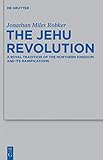The Jehu Revolution : A Royal Tradition of the Northern Kingdom and Its Ramifications / Jonathan Miles Robker.
Material type: TextSeries: Beihefte zur Zeitschrift für die alttestamentliche Wissenschaft ; 435Publisher: Berlin ; Boston : De Gruyter, [2012]Copyright date: ©2012Description: 1 online resource (343 p.)Content type:
TextSeries: Beihefte zur Zeitschrift für die alttestamentliche Wissenschaft ; 435Publisher: Berlin ; Boston : De Gruyter, [2012]Copyright date: ©2012Description: 1 online resource (343 p.)Content type: - 9783110284898
- 9783110285017
- 222.54095
- online - DeGruyter
- Issued also in print.
| Item type | Current library | Call number | URL | Status | Notes | Barcode | |
|---|---|---|---|---|---|---|---|
 eBook
eBook
|
Biblioteca "Angelicum" Pont. Univ. S.Tommaso d'Aquino Nuvola online | online - DeGruyter (Browse shelf(Opens below)) | Online access | Not for loan (Accesso limitato) | Accesso per gli utenti autorizzati / Access for authorized users | (dgr)9783110285017 |
Browsing Biblioteca "Angelicum" Pont. Univ. S.Tommaso d'Aquino shelves, Shelving location: Nuvola online Close shelf browser (Hides shelf browser)
Frontmatter -- Acknowledgements -- Table of Contents -- CHAPTER 1. Introduction: Objectives and Methodology -- CHAPTER 2. The Literary Jehu: A Construct and its Ramifications -- CHAPTER 3. The Jehuide Dynasty -- CHAPTER 4. The Israel Source in the Book of Kings: From Jeroboam I through Joram -- CHAPTER 5. Historicity and the Bible: Evaluating the Biblical Materials for Reconstructing Israel’s History -- CHAPTER 6. Akkadian Sources -- CHAPTER 7. Levantine Epigraphy: Tel Dan, Mesha, Zakkur, Samarian Materials -- CHAPTER 8. Conclusions -- Appendix: The Israel Source -- Bibliography -- Index of Biblical Citations
restricted access online access with authorization star
http://purl.org/coar/access_right/c_16ec
This monograph re-evaluates the literary development of 2 Kings 9–10 within the context of the Deuteronomistic History. This undertaking opens with a thorough text and literary critical examination of the pericope, arriving at the conclusion that the narrative of 2 Kings 9–10 represents neither an insertion into the Deuteronomistic corpus, nor an independent literary tradition. Rather, when considering the Greek textual traditions of the biblical narrative (most especially B and Ant.), one can appreciate the narrative of Jehu’s revolution within the literary context of an extensive politically motivated narrative about the Israelite monarchy covering the period from the reigns of Jeroboam I to Jeroboam II. The identification of this pro-Jehuide source within the book of Kings enables a reliable dating into the 8th century BCE for much of the material in Kings focusing on the Northern Kingdom. Comparing this biblical narrative to other (mostly Mesopotamian and Syrian) texts relevant to Israelite history of the period advances the discourse about the veracity of the biblical narrative when contrasted with extrabiblical traditions and permits the plausible reconstruction of Israelite history spanning the 8th and 9th centuries BCE.
Issued also in print.
Mode of access: Internet via World Wide Web.
In English.
Description based on online resource; title from PDF title page (publisher's Web site, viewed 28. Feb 2023)









